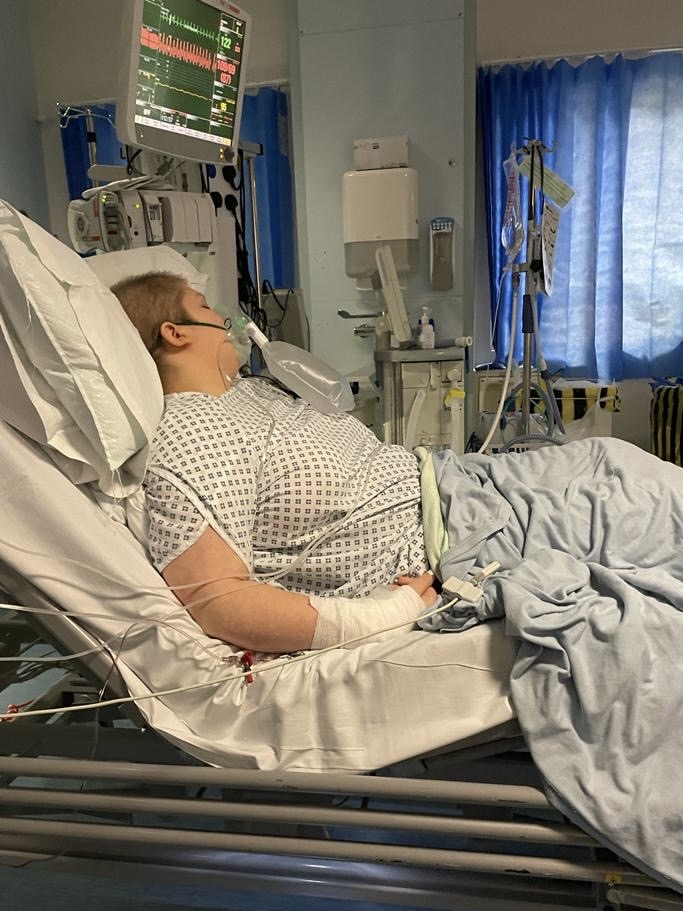Living with disability after cancer
Eilidh
For most of her teenage years, Eilidh received treatment for acute lymphoblastic leukaemia followed by thyroid cancer. Now a wheelchair user, she talks body-positivity, social attitudes, and breaking stigmas around disability.
Content warning: discrimination/bullying around disability
Cancer was all I had known since I was 14 years old. After three long years of cancer treatment living in a bubble of chemotherapy, lifesaving surgery and a medically induced coma, I expected to jump back into my old shoes and walk the way I used to. I never realised just how much things had changed.
Coming to terms with my disability
I was left needing to use a wheelchair. It took a while to get used to and I struggled to come to terms with how much I had to adapt, just to live my life. I suppose the worst obstacles are the attitudes from wider society, and the lack of accessibility. When I want to do something normal, I am always aware of that barrier. I have lost a lot of independence, and for years I would not go anywhere without someone with me, just so I had a helping hand. More recently I have been made more aware of my vulnerability when being in a wheelchair. I may be seen as an easy target and anyone could potentially take control of my chair. That scares me and I hope there is a day when this will not be something that I worry about.
When people - especially adults - are walking past me in the street and stare, I always wonder what they are thinking. No one will ever come up to me and just ask. I am pretty open about my disability and I try to give the best answers to their questions. My disability is something I enjoy speaking about. I am proud of it, but society sometimes makes me feel like I should be ashamed of it. That is why I enjoy working with children because they are so upfront with any questions they are thinking. It is better that children learn from an early age that it is not a bad thing to look a bit different and understand it is okay to ask questions.
Online is the worst place for any form of outright bullying or offensiveness. I have had the occasional private message saying: ‘why are you wasting NHS money?’ or accusing me of faking my disability because I can walk and stand in videos and photos I post.
When I went back to school, people treated me like I was suddenly less intelligent because I used a wheelchair. In my head I would always think, ‘just because my legs don’t work, that doesn’t mean by brain has stopped working’. There is so much stigma around the idea that if you have a disability of any kind, your life is put on pause and you have to adapt your entire future around that disability.
I felt that nobody could love me with all my baggage.
Hidden disability
My wheelchair is an obvious visible disability but an invisible disability I live with is my fistula bag, which for years no one knew about except my family and close friends. I never told anyone about it because it was something I was extremely ashamed about. My life changed so much and I had to be flexible as my fistula bag could be very unpredictable. When I found the first ever Instagram page of someone who had a bag, I just thought, ‘wow, other people with bags do exist.’ Seeing that brought a whole lot of new feelings towards my own bag.
After hiding my bag for roughly three years, I decided I wanted to break the internet by sharing a photo of me and my bag saying: ‘say hello to my bag!’. I was expecting horrific reactions, due to the negative ideas and opinions I had around it, but people were really accepting and wanted to learn. This helped me develop a better relationship with my bag and surrounding body, and it felt like I was looking at it through another set of eyes. Before, I only felt beautiful above my stomach but now my bag and all the surrounding skin is beautiful. I love every part of myself.
Learning to love my body
After finishing treatment, I had to take time for myself to rediscover who I was. For four years I had had nurses for friends and my hospital room became my bedroom. It took months just to find out who I was and what my purpose was in life. I discovered that just because cancer had left me and I had become cancer free, that not everything about me had changed and I was still the same person. I have been discovering more about myself and learning to accept who I am both inside and out. Over time, my confidence has improved, and this has helped with my self-esteem.
During treatment, I felt disgusting and ugly when experiencing body changes and violated with all the foreign objects that were connected to my body. I felt that nobody could love me with all my baggage and felt my disability and illnesses would be seen first before me. It has taken years to build my self-worth and learn to truly love myself which I am now happy to say I do.
I’ve started an Instagram account, which I feel is a happy and safe space. Being able to share my story online has slowly helped me to heal and gain closure. Being able to show that any extra baggage you carry and all the labels and differences that are pinned over your head do not change who you are. If anything, they make you more unique and make you you.





